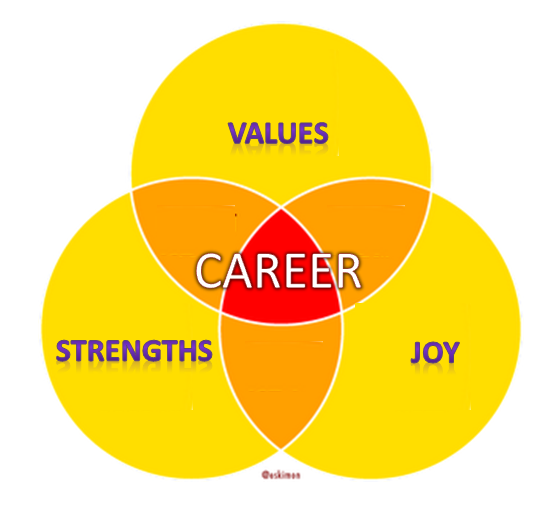Matthias Birk’s “How to Pick the Right Career for You” workshop was an enjoyable reflection on what strengths, joys, and values we each have. Matthias was a candid speaker, and related much of what he taught to his own experiences- both good and bad. He stressed that we may end up leaving the workshop with more questions than answers, but that we could use the information we gained to better understand which careers better suit us. The steps in this workshop were simple and flowed logically from one exercise to another: we identified our strengths, joys, and values, and then determined potential next steps to finding a career. This may look simple on paper, but in reality it can be quite difficult, so I will walk you through each step below. Matthias’ workshop materials are available through the iJOBS Past Events page- see the link at the bottom of this post.
- Identify your strengths. For this step, Matthias encouraged us to “think broadly-” a strength is not a particular lab technique, but a quality that helped you master that technique. To get started, identify what strengths you had as a child, or what strengths others see in you, such as friends, parents, and teachers. Identify what you do naturally without significant effort. After this, write down what you perceive your strengths to be. Once you have a good understanding of your own natural strengths, you can move on to what your joys are.
- Identify what brings you joy. To do this, Matthias had us write down a specific experience in work or life where we felt truly alive and at our best- maybe even lost track of time! After writing down a description, describe this event to a partner by detailing what happened, what you were doing, and where you were at the time. Most importantly, describe what specifically about it gave you joy and happiness. One participant’s example was running, and Matthias pointed out that running can bring joy for a multitude of reasons- examples include being competitive (marathon runners), enjoying the outdoors, etc. It is important to understand the underlying qualities of why you enjoy certain activities to be able to recognize what kind of work environment you will thrive in.
- Identify your values. We were asked to circle values we identified with from a list Matthias provided. We chose our top ten and ranked them from 1-10. Don’t worry- many of the participants (myself included) struggled with this step! Once you have your list of core values, evaluate them against how well you’re living these values now. To facilitate this, refer to Matthias’ workshop materials. Put your top ten values on each spoke, and for each value, mark from 0-100 on the concentric circles how much you believe you are living that value. Connecting the marks gives a realistic readout of how well you are living your overall values right now. It was surprisingly jarring for me, and probably for others as well- life can be difficult for graduate students! To remedy this, Matthias had us discuss with others what concrete steps we could take to raise our values.
 Now that you’ve identified your strengths, joys, and values, you can begin to match them to the types of careers that draw on those qualities. For example, I work well in teams that are not overly competitive, which allows me to evaluate what types of careers foster that environment. In short, it provided a stronger foundation for the career direction I was already considering. This workshop was referred to as a good “pre-IDP” exercise- a way to self-evaluate that was less nebulous than immediately ranking yourself on different tasks.
Now that you’ve identified your strengths, joys, and values, you can begin to match them to the types of careers that draw on those qualities. For example, I work well in teams that are not overly competitive, which allows me to evaluate what types of careers foster that environment. In short, it provided a stronger foundation for the career direction I was already considering. This workshop was referred to as a good “pre-IDP” exercise- a way to self-evaluate that was less nebulous than immediately ranking yourself on different tasks.
If you feel that you aren’t sure what type of career would best suit you, I strongly encourage you to go through this process. If you can readily identify your strengths, joys, and values, congratulations! There is an Oyster event on April 26th that matches IDP results to current job postings that is a good next step in this process.
Matthias Birk’s recommended reading:
How to Stay Stuck in the Wrong Career by Herminia Ibarra: Ibarra has researched what makes a career transition successful, and has found that trying a new career before you switch, making connections, and finding a trigger to switch is critical for a successful career transition.
Strengths Finder 2.0, Tom Rath
You can view Matthias’s presentation slides, exercises, and values wheel at the iJOBS past events page under 24 February 2016: http://ijobs.rutgers.edu/events.php#past-events
